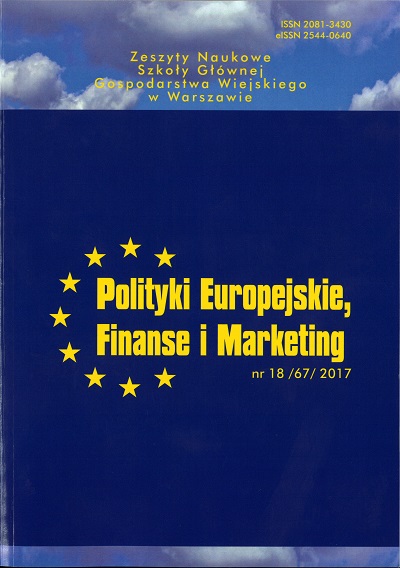Main Article Content
The article is devoted to the treats of the shadow economy for public finance. The close attention was paid to the taxation gap and factors fostering shadow economy. The Pearson coefficient index was used in order to identify the strength of the correlation among chosen variables influencing the taxation gap. Based upon the results it should be stated that factors fostering taxation gap ought to be reduced and more complex action towards reduction of the shadow economy is required to be taken
Article Details
Alm J., Torgler B. Culture differences and tax morale in the United States and in Europe. Journal of Economic Psychology, Vol. 27 No. 2, 2006 (Crossref)
Ainsworth R.T. VAT fraud as a policy stimulus - is the US watching? VAT withholding VAT and the Mittler Model, BU Law Working Paper 11-08, February, 2011 (Crossref)
Brubaker R. Nationalism Reframed: Nationhood and the National Question in the New Europe. Cambridge University Press, Cambridge. 1996 (Crossref)
Buszko A. Cultural Implications for the Shadow Economy. Engineering Economics. 2017 (under printing process) Centrum im. Adama Smitha. Gdańsk. Dzień Wolności Podatkowej w Polsce. Warszawa. 2017
Ceyhun R., Burak R.U. Public debt, sovereign default risk and shadow economy. Journal of Financial Stability No 9, 2013 (Crossref)
Choi P.J., Thum M. The dynamics of corruption with the ratchet effect", Journal of Public Economics, Vol. 87 Nos 3/4, 2003 (Crossref)
Dabla-Norris E., Feltenstein A. An analysis of the underground economy and its economic consequences. Working Paper 23/03, Washington, DC, International Monetary Fund. 2003 Doing Business. World Bank. Washington. 2017 (Crossref)
Florea A., Schiop C. Are there any positive consequences of underground economy? Fascicle of Management and Technological Engineering, Volume VII (XVII). 2008
Gazeta Prawna. 21.09.2017
Gut, P. Experimental Evaluation of the Efficiency of the Third Party Joint and Several Liability in the Polish VAT System. European Journal of Economic Studies, Vol.(12), Is. 2 2015 (Crossref)
Harvey F. National cultural differences in theory and practice Evaluating Hofstede's national cultural framework. Information Technology & People, Vol. 10 No. 2, 1997 (Crossref)
Hindriks J., Keen M., Muthoo A. Corruption, extortion and evasion. Journal of Public Economics, 74(3), 1999 (Crossref)
Katrechka, A. The effect of the shadow economy on social development. A comparative study on advanced and least developed countries. University of Gothenburg. 2014
Krstić G., Schneider F. Formalizing the Shadow Economy in Serbia. Policy Measures and Growth Effects. Springer Cham Heidelberg New York Dordrecht London. 2015 (Crossref)
Laruelle M. The concept of ethnogenesis in Central Asia: political context and institutional mediators (1940- 50). Kritika: Explorations in Russian and Eurasian History 9 (1), 2008 (Crossref)
Mara E.R. Causes and Consequences of Underground Economy. MPRA Paper No. 36438, 2012
Misati R. N. The role of the informal sector in investment in Sub-Saharan Africa. International Entrepreneurship and Management Journal, 6(2) 2010 (Crossref)
PwC. Luka podatkowa w VAT - jak to zwalczać? Warszawa. Styczeń, 2014
Ramey G., Ramey V. Cross-country evidence on the link between volatility and growth", Working Paper 4959, Cambridge, MA, NBER. 1994 (Crossref)
Reimers, O. CESifo DICE Report 4/2014 (December)
Rocznik Statystyczny Rzeczypospolitej Polskiej. GUS. Warszawa. 2017
Schneider F. The influence of public institutions on the shadow economy: an empirical investigation for OECD countries, Review of Law and Economics 6, 2010 (Crossref)
Schneider, F., Hametner B. The shadow economy in Colombia: size and effects on economic growth (No. 0703). Working Paper, Department of Economics, Johannes Kepler University of Linz, 2007
Schneider F., Raczkowski K., Mróz B. Shadow economy and tax evasion in the EU. Journal of Money Laundering Control, Vol. 18 Iss 1, 2015 (Crossref)
Spiro, P.S. Tax Policy and the Underground Economy [in:] Schneider F., Bajada, Ch. Size, Causes and Consequences of the Underground Economy. Ashgate Publishing, Aldershot, England 2005
Torgler B., Schneider F., Schaltegger C. Local autonomy, tax morale, and the shadow economy, Public Choice 144, 2010 (Crossref)
Töttel U., Büchler H. Research Conferences on Organised Crime at the Bundeskriminalamt in Germany 2008 - 2010. Wolters Kluwer Deutschland GmbH, Köln. 2011
Transparency International. Corruption Perception Index 2015. London. 2016
Wojciechowski, T. Podatki w Polsce, jesteśmy europejskim liderem w kosztach ściągalności danin. Gazeta Prawna. 5 marzec, 2015
https://statistics.laerd.com/ data of access 2017/09/23
http://www.heritage.org/index/about date of access 2017/09/24
Downloads
- Jolanta Zrałek, Kim jest zrównoważony konsument? W poszukiwaniu nowej koncepcji człowieka w zrównoważonej gospodarce , Zeszyty Naukowe SGGW, Polityki Europejskie, Finanse i Marketing: Nr 17(66) (2017)
Możesz również Rozpocznij zaawansowane wyszukiwanie podobieństw dla tego artykułu.
- Andrzej Buszko, Czy szara strefa rzutuje na poziom Bezpośrednich Inwestycji Zagranicznych? Przypadek Polski i polskich regionów , Zeszyty Naukowe SGGW, Polityki Europejskie, Finanse i Marketing: Nr 26(75) (2021)

Utwór dostępny jest na licencji Creative Commons Uznanie autorstwa – Użycie niekomercyjne 4.0 Międzynarodowe.





